Shortly after 8 p.m. on Memorial Day, May 25, Mahmoud “Mike” Abumayyaleh got a panicked phone call from a teenage employee at the store he owns with his three brothers. “Mike! Mike! They’re killing him,” she said. “My heart dropped. Like, it fell to the ground,” Mahmoud told me. He had no clue what she was talking about. At first, he assumed a customer was accosting a worker.
Frantically, his employee explained what was happening: A police officer had pinned a customer to the ground outside the store, and that man was saying he couldn’t breathe. Mahmoud manages the day shift at CUP Foods at the corner of 38th Street and Chicago Avenue in southern Minneapolis, but that night, young employees were working the store alone. There’d been a brief confrontation with a man accused of passing a fake bill. Then an 18-year-old clerk dialed 911. The man was named George Floyd, and minutes later, a cop was kneeling on his neck.
By the afternoon after Floyd’s killing, CUP Foods’ voicemail box was full. As the day wore on, a devastated and furious group began to gather at the intersection. They chanted, prayed, and consoled one another. Outside the shop, numbers swelled into the thousands.
In the months that followed, the intersection would become a fortress of grief and protest with sculptures, murals, and constant visitors. Armed groups would patrol the area, and police would stay on the other side of barricades. The store would be vandalized repeatedly, with “FUCK CUP FOODS” spray-painted on the exterior. Even longtime customers would question whether it ever deserved to reopen. The Abumayyaleh brothers would fret over lowball offers to buy them out after Friday prayers at the mosque in the store’s basement and struggle to imagine a future for a family business with a complicated past.
But in those first days, they were only sure of one thing. “Between the phone calls, threats, the protesters outside,” Mahmoud said, he and his brothers decided they had to temporarily shut down. He said he believed that most of the threats CUP Foods was getting were a form of grief, expressions of outrage from people who felt powerless after watching another Black man get killed by police. But he still didn’t know what might happen. When the brothers closed the doors, they had no idea if they’d ever reopen at all.
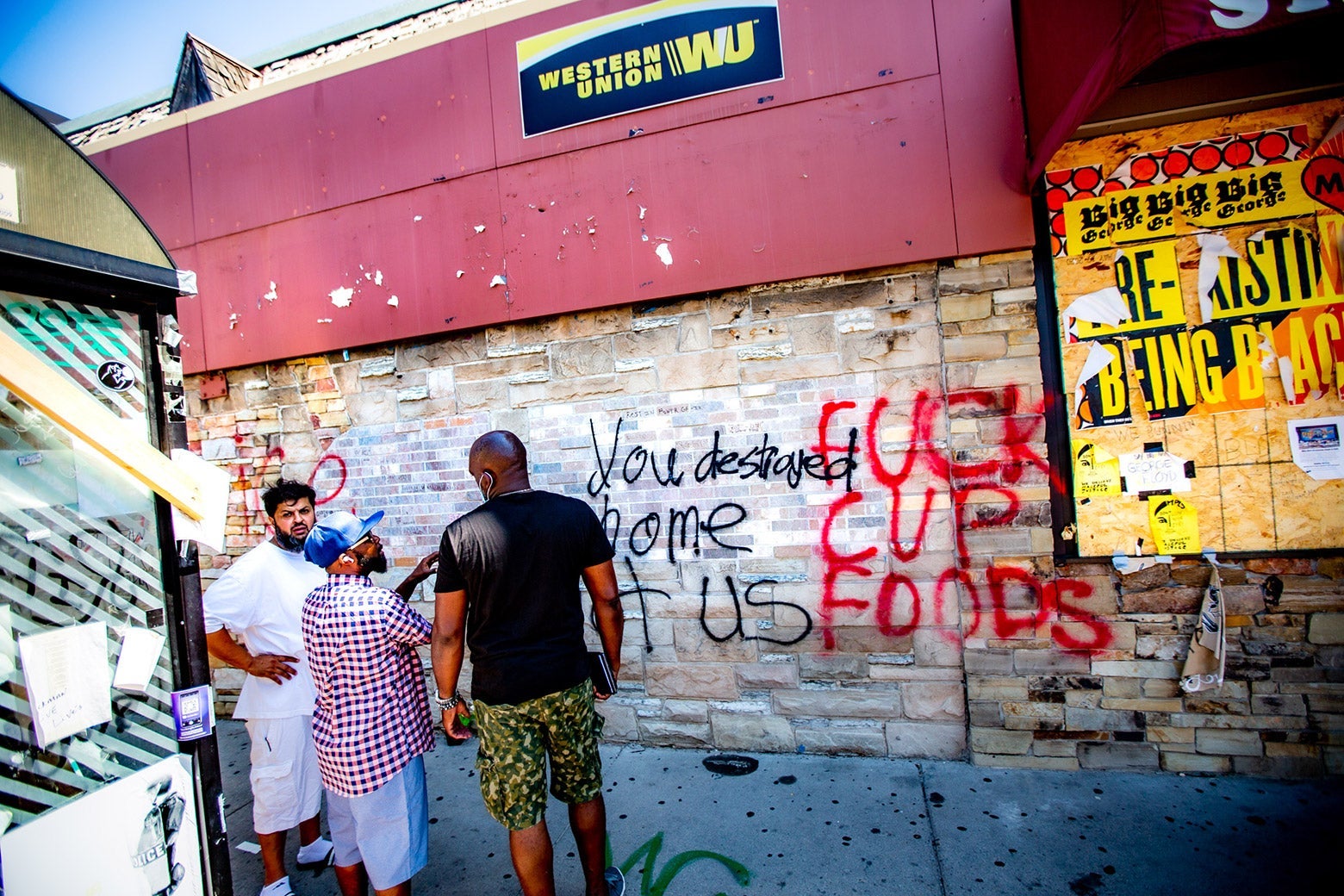
More than 30 years ago, Samir Abumayyaleh had a choice to make. Born in Palestine, he was the oldest son of a family that arrived to the United States when he was a child. The family moved to North Minneapolis to open a small convenience store. When Samir graduated high school in 1989, he could either go to college or start his own shop like his father, Hamadeh, had and help stabilize the finances for his parents and their 10 kids. He found an opportunity to lease a promising space on the other side of town, in South Minneapolis. The property had once been a drugstore and sat at the intersection of four neighborhoods. Samir went for it. He called his tiny corner store Chicago Unbeatable Prices, later shortened to just CUP. Over time, it expanded to include a deli, a cellphone repair shop, a notary public, and MoneyGram services.
In its early years, only Samir and his parents worked in the store. They would sit outside, sipping coffee and tea, handling sporadic customers, while the kids ran around playing inside. As soon as his younger brothers were old enough—maybe before they were—they started to take shifts at the store too.
Six years ago, Samir passed off responsibility for managing the store to three of his siblings, Mahmoud, Nabil, and Ahmad, though he’s still a familiar figure there, known to most people as “Sam.” Samir is now 49 years old, and his hair is white and thick. He assertively leans forward when talking, but his voice is soft. He is eager to see business return to normal, but, he told me, as a native Palestinian, he understands the frustration coming from the protesters outside. “God made this happen for a reason,” he said in Arabic. “It started a real reckoning that was needed. The way these cops treat Black people here can never be justified.”
Samir’s younger brothers have spent their entire lives on this corner. “I started working when I was like 12, 11,” said Mahmoud, who is now 36, and only agreed to be interviewed inside the shop if he could keep working and answering calls while we talked. “I started working full time when I was 15, seven days a week, during school, no breaks. And by the time I was 17, I was holding a shift by myself. And by the time I got to 21, 22, I got married, and by 25, I was holding the store down by myself.” Mahmoud now has four kids, one of whom, at 13, already works at the store.
Samir’s youngest brother, Ahmad, 32, manages the night shift. There are enough years between Ahmad and Samir to make him Samir’s child. He was only 1 year old when CUP Foods opened. “A lot of customers remember me in diapers. I swear, I have pictures with them,” he said. In college, he imagined a career outside of his family’s business. He studied computer engineering and even got a corporate job after he graduated, still taking occasional shifts at CUP. But now, he’s invested in keeping the store running and in the family.
Nabil, 46, once managed the store but now looks after some of the 15 or so other properties the brothers own. Their buildings house a laundromat, a barber shop, and other businesses in neighborhoods around Minneapolis and St. Paul. Nabil has three sons who take regular shifts behind the counter at CUP Foods, and the brothers hope they will become the next generation of managers. “I’m trying to pass it on to them,” he said. “They won’t have to work for somebody else.”
The four Abumayyaleh brothers now co-own the shop together. There are reminders of their parents everywhere. A portrait of Hamadeh, who died in 2012, hangs on the wall behind the register. A recorded recitation of the Quran plays on repeat off one of the computers, just like it did when their parents ran CUP Foods. The mosque in the basement, used by Muslims who work at local stores, auto shops, and restaurants, is dedicated to their mother’s memory: It’s called Masjid Ni’mat ul-Islaam. Her name was Ni’mat. “Our Mama, God rest her soul, when she was alive, she made me promise,” Mahmoud said, “ ‘Don’t ever sell this business.’ ”
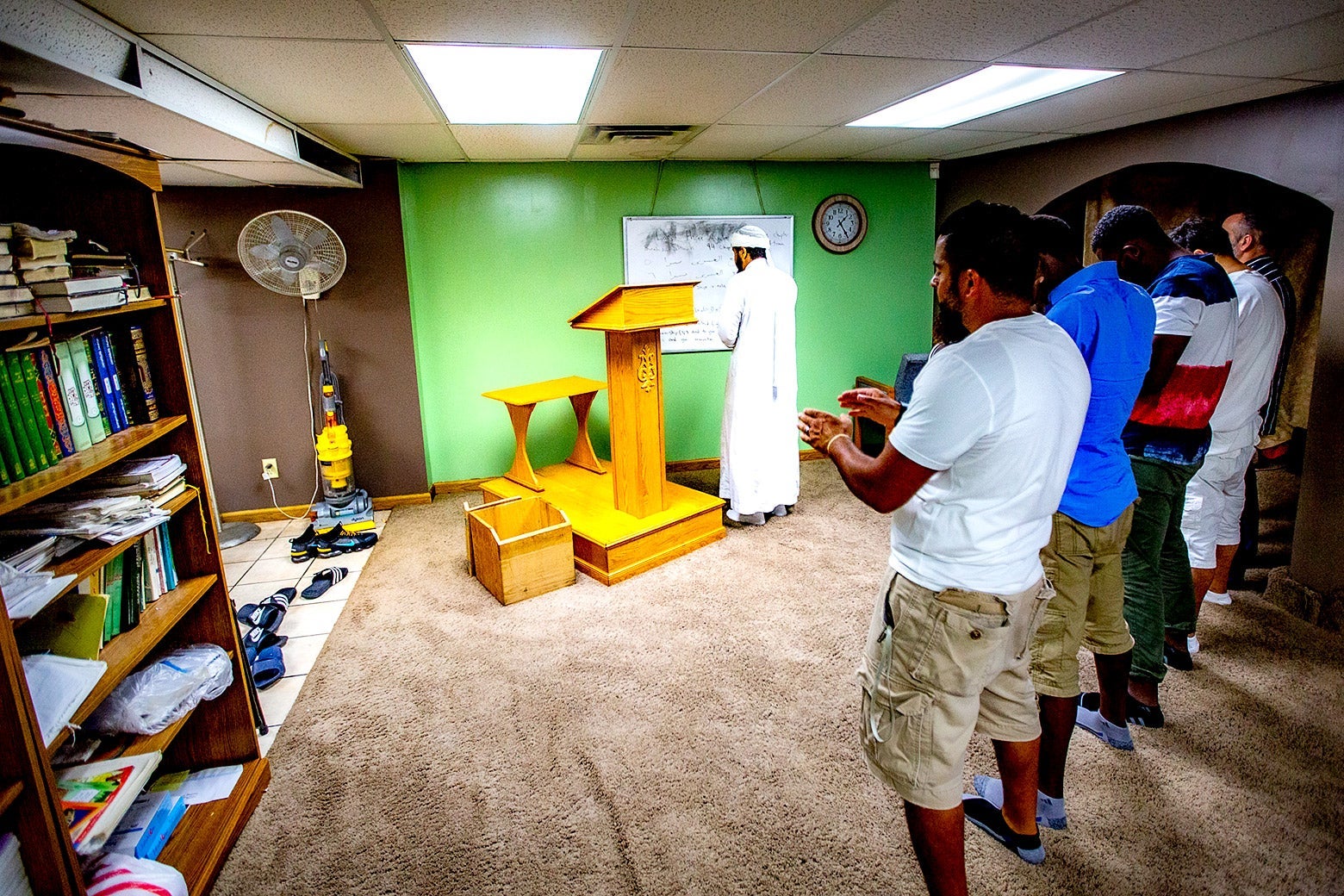
During the first week after Floyd’s killing, someone threw a rock through CUP Foods’ window. When I first visited in late July, the brothers still hadn’t fixed it. A large wooden board covered part of the storefront. As I toured the shop, a neighbor was helping with the cleanup, sweeping broken glass from the floor.
The early aftermath had been hard to fathom. As the protests went national, they intensified around Minneapolis. Two miles northeast, the 3rd Precinct police station was set ablaze. The authorities fired tear gas at protesters and journalists. The governor called in the National Guard. The governor and mayor also put a curfew into effect. Within the week, Derek Chauvin, the officer filmed kneeling on Floyd’s neck, had been charged with murder.
Mourners brought flowers and balloons to place where Floyd died near CUP Foods’ doorstep. Organizers brought markers and card stock for protesters to make their own signs. In the week after the killing, many left their signs on the ground or taped to the walls, blending in with the spray-painted graffiti that read “I Can’t Breathe” and “Black Lives Matter.” While other areas of Minneapolis saw looting, locals and protesters wanted to preserve the area as a place of protest, especially the space immediately in front of CUP Foods. They established a perimeter around the intersection with barricades and declared it beyond the jurisdiction of the police.
On June 15, Mahmoud and his brothers tried to open the store back up. That didn’t last long. Many protesters who were holding the area down, including residents and activists from Chicago, viewed the reopening as an insult to Floyd’s memory and their cause. People who were organizing around the store told the owners it wasn’t safe to open—according to Mahmoud, they told the brothers, “Guys, there’s too much animosity. There’s too much pressure. It’s not safe”—and they promptly closed back down.
Among those who warned the brothers to keep the store closed was a group called the Agape Movement, co-founded by a former gang member, who appointed themselves to keep the intersection safe. The name refers to a theological term for Christian love. When I was there, several of them were armed. I spoke with one of the Agape leaders, Steve Floyd, who said he was a distant relative of George’s. (“We’re from the same plantation,” he told me.) Some people—Floyd described them as an angry group separate from the main protesters—“were ready to bomb that store and burn it up,” he said. He’d lived in the neighborhood some 40 years, a decade longer than CUP Foods had been there.
Steve Floyd doesn’t blame CUP Foods directly for George’s killing, but he wouldn’t call the store’s owners blameless. “They did what people typically don’t do: pointing somebody out for something you don’t even get arrested for,” he said, referring to the neighborhood reluctance to call the police for nonviolent crimes.
Another local, Carmen Means, who is the executive director of a Minneapolis urban development group, told me that she believed the store should close “right now, because of the role they played—and to be clear, they did not kill George Floyd, but they did play a meaningful role in the lynching of George Floyd—that speaks to the culture of the store,” she told me. “My personal experience inside the store, I didn’t have any issues. I won’t lie and say that I did,” she said. “The challenge,” she said, “is what the store represents.”
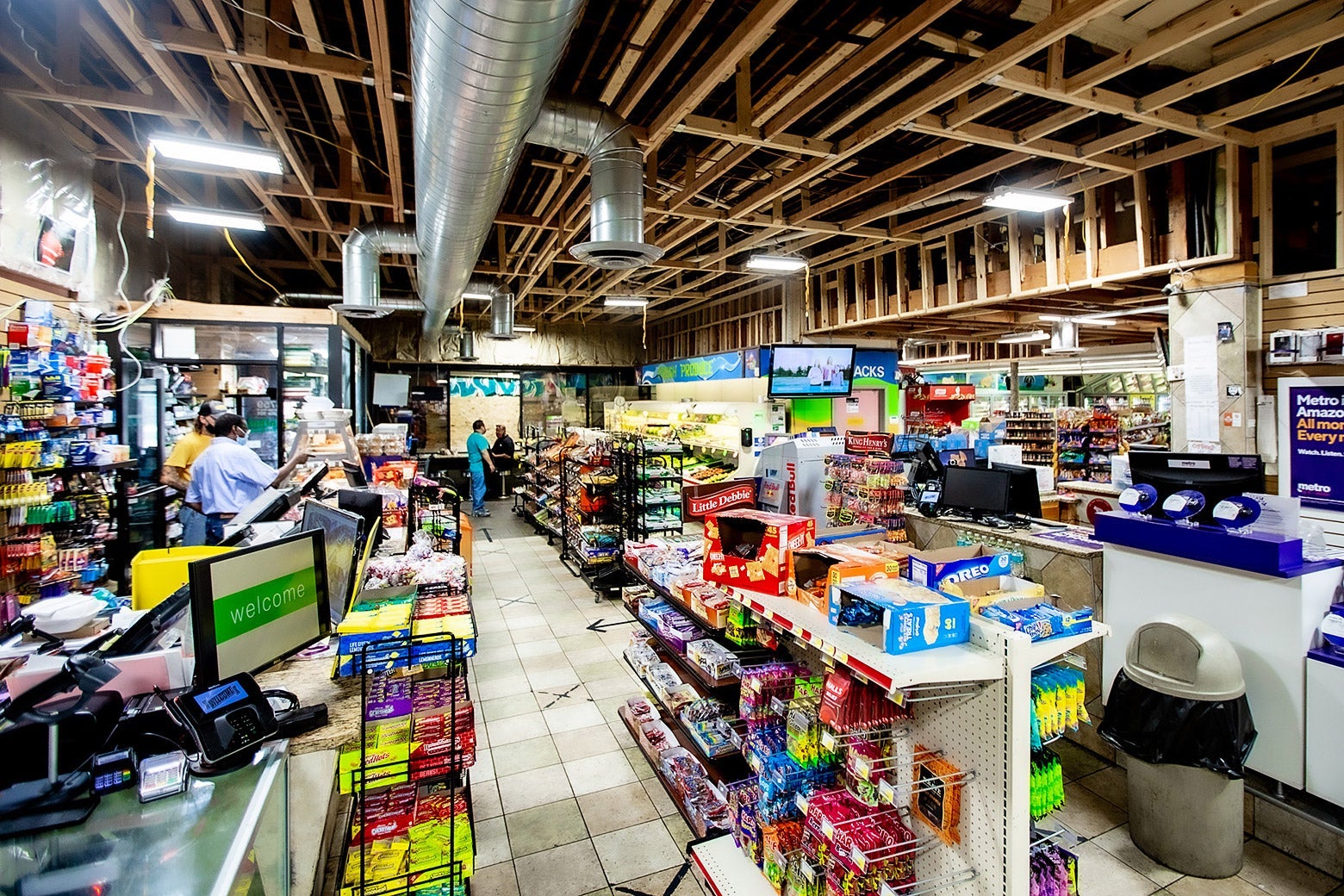
Every time I asked the Abumayyalehs if I could meet the clerk who called 911, they said it wasn’t going to happen. He’s remained hidden from public view, his identity shielded by the rest of CUP Foods’ staff. But on one of my trips to Minneapolis, someone close to the store put us in touch. When we finally talked, he told me I was the first reporter he’d spoken to.
Malik, who agreed to speak if I used a pseudonym, had arrived from West Africa last year to join relatives who were living in Minnesota. Malik is a U.S. citizen but had lived abroad since he was a baby. English is his second language, and even as a tall Black teenager himself, he told me that he wasn’t especially aware of the dynamic between Black Americans and the police. When he dialed 911, he said he had no idea what could happen. The transcript of the call shows someone not quite used to calling the police:
Operator: Is he white, Black, Native, Hispanic, Asian?
Caller: Something like that.
Operator: Which one? White, Black, Native, Hispanic, Asian?
Caller: No, he’s a Black guy.
Operator: All right. (sigh)
Caller: How is your day going?
Operator: Not too bad.
Caller: Had a long day, huh?
“The first week that he died, I was disturbed a lot. I couldn’t sleep,” Malik told me when we met in the city. “I’ve been thinking about it every day. Every night. Sleeping, dreaming, sitting, doing nothing.”
Malik said he had barely interacted with Floyd the night he was killed. “He just came in, said, ‘What’s up?’ to me, before everything happened. He came to all the employees, was saying ‘hi’ to everybody,” he said. “CUP Foods is usually like that.”
After Floyd paid and left, a clerk passed the bill he used through a machine that identified it as fake. Another teenage employee confronted Floyd outside the store. According to Malik, Floyd refused to return the items he had purchased and cursed them out—“basically trying to be extra on them,” as Malik put it. As the other teenager returned to the store, Malik said the employee told him to call 911. So Malik did. “He [Floyd] is sitting on his car cause he’s awfully drunk. He’s not in control of himself,” Malik told the 911 operator.
When Mahmoud got the desperate call from his employee, the police were there, and Floyd was pinned down outside. Mahmoud said he told the employee to call the police again. Specifically, he said, “call the police on the police—and make sure you record it.” Mahmoud said he had been through this before. He said a police officer used to harass CUP Foods’ customers around the store, so he called the cops on the cop. “It worked,” he said, and the harassment stopped.
It wouldn’t work this time. A 911 dispatcher who was watching a live feed of the interaction had also reported the officers’ actions, to no avail. Chauvin knelt on Floyd’s neck for eight minutes while onlookers pleaded with him to stop. Surveillance video I later reviewed showed one of Nabil’s sons, who was at the store, trying to intervene, and the police shoving him away. An hour later, Floyd was pronounced dead. “I was in shock,” Mahmoud said.
Malik slid into despair after Floyd’s killing. “I was feeling that I’m done with life, and stuff. Like, why am I even living? I don’t deserve to be breathing, stuff like that,” he said. Malik can’t take time off, because he supports himself. “I have to work because everything I’m doing in life, bills and everything, I have to pay by myself. I have to pay my own rent, take care of myself, and my family,” he told me.
Things have gotten a bit easier since the early days but not by much: “I’m still working on it, but at least I sleep now three to four hours a day.” The killing doesn’t just follow him around in his head: “Sometimes I answer random calls from people I don’t know, and they say some bad stuff, like, ‘You guys killed George Floyd.’ ”
The Abumayyaleh brothers are worried about Malik, particularly Mahmoud. He’s in regular contact with the teen’s family and told me he’s concerned that he’s entered a deep depression.
When I talked to Malik, that concern felt warranted. “At least back home, I know how the stuff works better than the United States,” he told me. “Now, if it were up to me, I’d rather live in my mom’s country. It’s better than the United States. I’m not having any happiness. Only darkness.”
The brothers can’t help but feel that if only one of them had been there that night, things might have turned out differently. “We would have just taken the fake money and [banned] him like we do all the time,” Nabil said. “That’s what we do. Take the fake money and tell them you can’t come back in here for two years.” But the teens manning the store thought they were doing the right thing. “They got fake money; they called the cops,” Nabil said. “It was escalated by a piece-of-shit cop. He had no remorse for human life. None.”
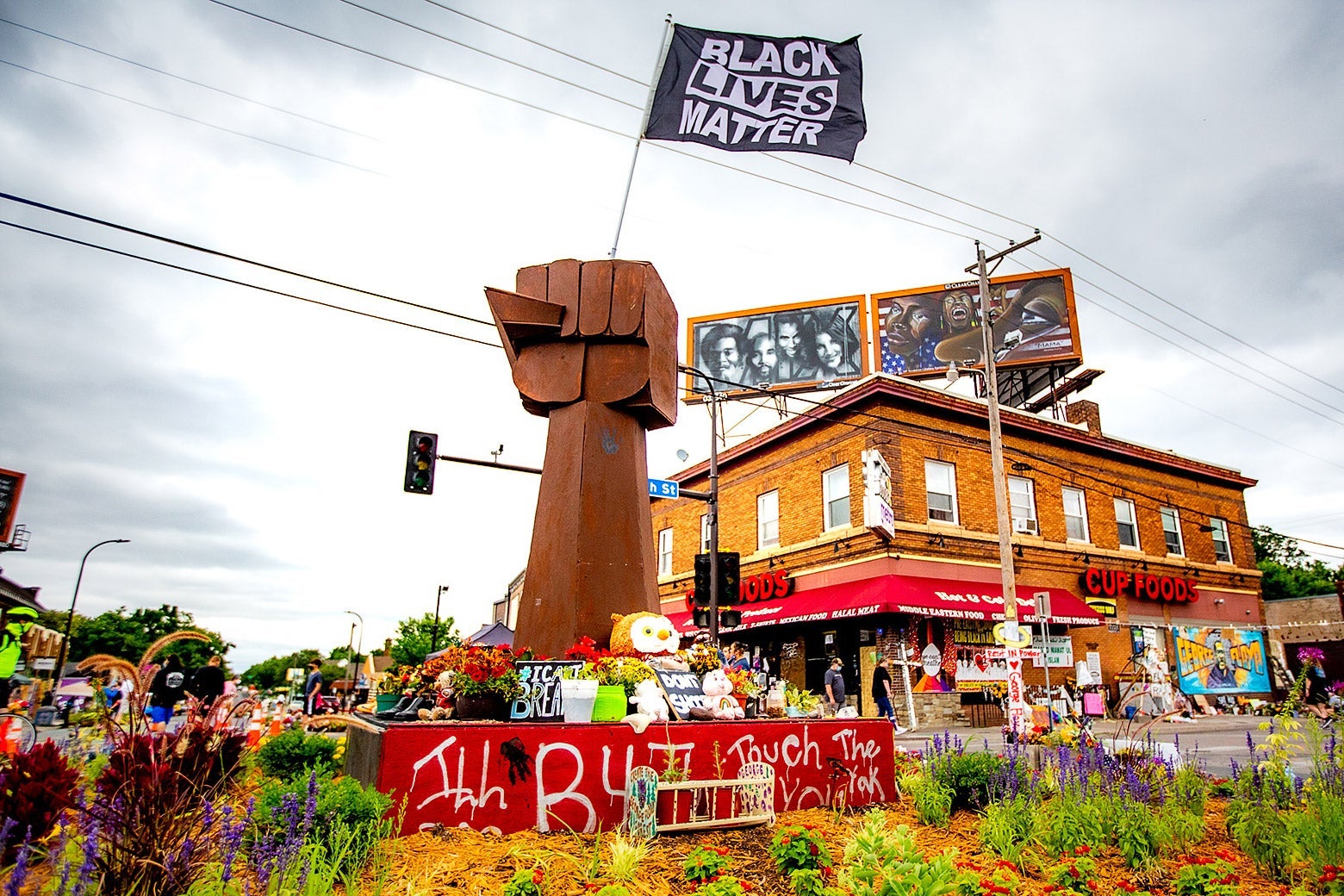
“We’ve kept CUP Foods from burning, that I know of personally, three times,” Marcia Howard told me the first time we spoke. She’s been living exactly 260 steps away from CUP Foods since 1998 and helps maintain the perimeter around the intersection. Howard calls herself the “community liaison for security.” She has a roll of other members on her walkie-talkie, and she wears a GoPro on her chest. (“Pics or it didn’t happen,” she tells me when I ask her why.)
She’s an English teacher at the local high school and has summers off, but she cites her years as a Marine as her primary qualification for this role. “As the city burned, 38th and Chicago took care of 38th and Chicago,” she told me—she handled breaches and threats of violence to her neighborhood from rioters, some of whom she said were from out of town. (A Black family who lives above the store would have been one unwitting target.)
Howard has an eagle-eyed view of the area. “I call it the ‘five C’s of the four corners,’ ” she said. “We’ve got the community, we’ve got the churches, we’ve got CUP, we’ve got the crooks in the alley, and we’ve got the cops. And if you want to know the story of 38th and Chicago Avenue, you have to know those five C’s and how they work in concert with and opposition to each other.”
With one of her C’s, Howard mentioned something I’d heard a lot in the area: that CUP Foods has sometimes been a hangout for people who deal drugs on the corner. Indeed, many protesters who want CUP Foods to stay closed told me they are convinced the neighborhood would be better off without it.
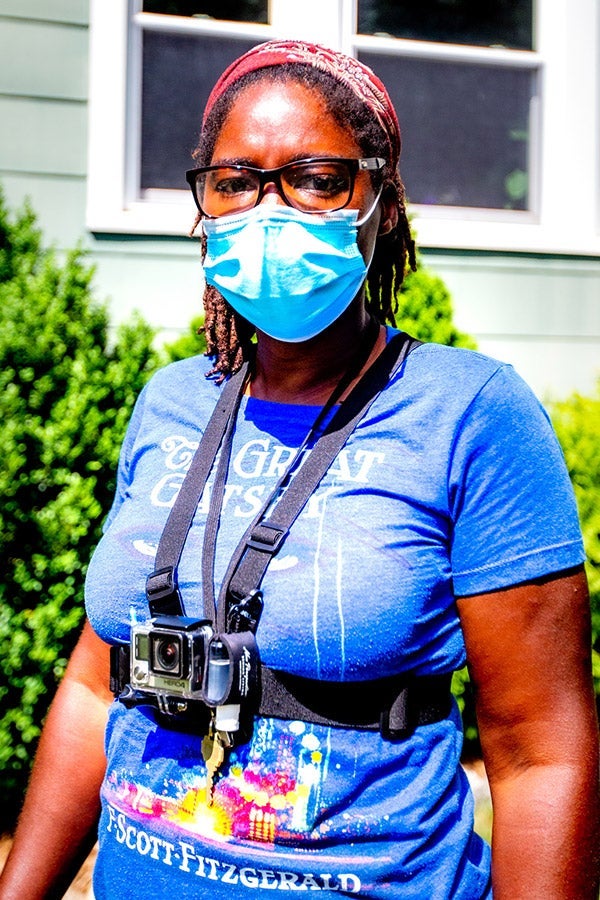
The brothers don’t deny that the intersection sees plenty of criminal activity, but they said that was an issue long before CUP Foods opened up. “This community right here, where we’re at, it’s Blood territory,” Nabil said, referring to the Bloods gang. “We can’t stop that. Let’s see the police take that away from them. We’re in their neighborhood.”
CUP Foods’ history with the police goes back almost to its opening. According to the brothers, in 1991, just two years after becoming a licensed grocer, the family began making formal complaints to the police about the “loitering” problem. They said they were advised to place “no trespassing” signs outside their store. In 1993, they said the city conditioned their license renewal on reducing store hours, reporting drug activity to the police, removing signs from their windows that obstruct the view from the outside, and employing off-duty police officers for security.
The corner got worse. In 1995, the murder rate in Minneapolis peaked. Reports from that year noted that the Bloods gang had taken control of South Minneapolis, and gun battles had become commonplace. (Minneapolis today is safer—the homicide rate in recent years has been less than half what it once was.)
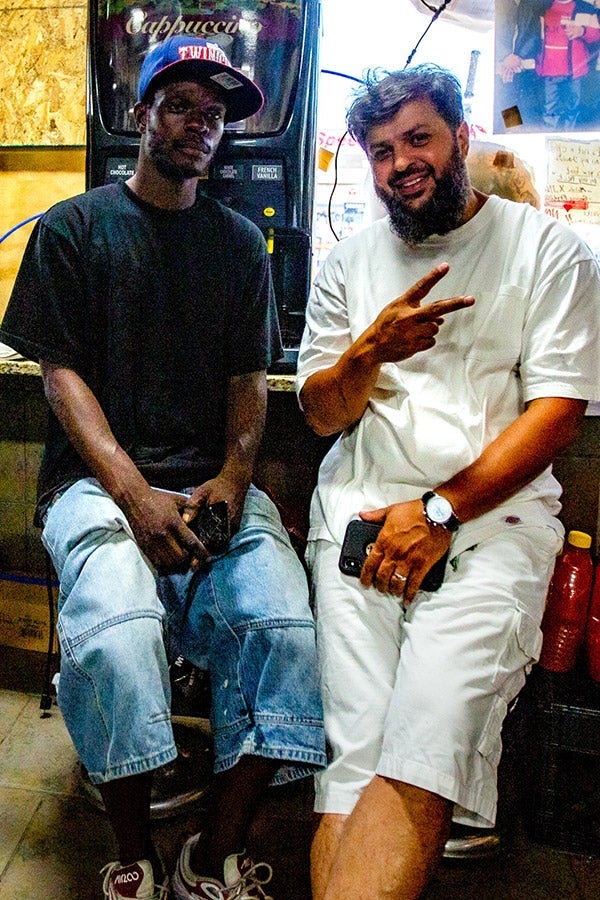
In 1998, according to court records, the police opened a file on CUP Foods in what it said at the time was a response to complaints about the store. The force surveilled the area and reported it saw people engaging in “hand-to-hand exchanges”—possible drug deals—in and around the store. An undercover cop purchased apparent crack cocaine from dealers, in what are known as “controlled buys,” inside the shop. But in that investigation, none of the brothers was ever convicted on drug charges. The state charged Nabil with unlawful possession of a firearm, but that charge was later dismissed.
Ahmad said that there was a time when Nabil “got caught up in the street activities himself.” Nabil told me, “I was born in the streets. I was a hustler, basically. … I ran the streets for many years not knowing what I was doing.” He specifically said he got in trouble for buying and selling electronics that he’d been told were stolen. “I was buying from this guy who worked for the federal authorities,” Nabil said. “He set me up.” The police got a search warrant based on that investigation, which ultimately led to a conviction for a separate instance of unlawful possession of a firearm.
After the 1998 drug investigation, police continued to coordinate controlled buys in the store, and on several occasions, drugs were allegedly purchased from dealers inside CUP Foods. According to an archived city document, in 1999 the Hennepin County Attorney’s Office commenced a nuisance-abatement proceeding against CUP Foods, which resulted in the city requiring CUP Foods employees to call the police on all illegal activities, or risk losing their license.
“We did make a deal with the city because we got many citations for people loitering outside,” Ahmad said. “They said that if we don’t call them, we get the ticket. So we had to call the police minimum 10 times a week to not get fined. We had a quota.” (The Minneapolis police said it had “no knowledge” of this quota and did not respond to follow-up requests.) “If we didn’t call, we get in trouble,” he said. “And if we did call, we get in trouble.”
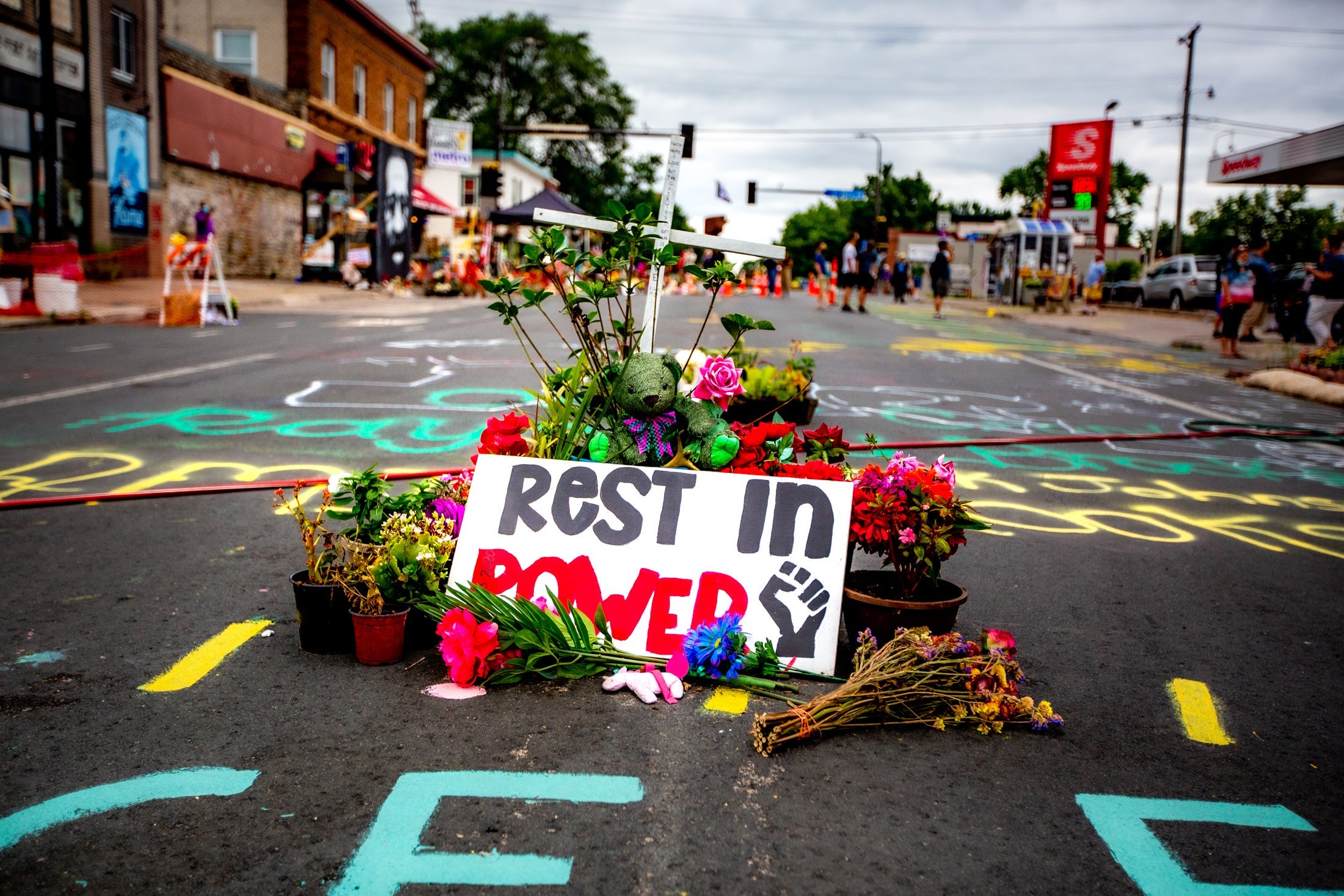
The corner where CUP Foods sits has now been dubbed George Floyd Square. The space outside the shop, where Floyd was killed, has become a sprawling memorial. On the ground where he was pinned by Chauvin, someone painted a silhouette with angel wings. It’s now a landmark, with people coming from around the world, some fresh off the plane with suitcases in tow, to see it for themselves. “Welcome to George Floyd Square,” volunteers say with a smile, offering up a spritz of hand sanitizer and a mask.
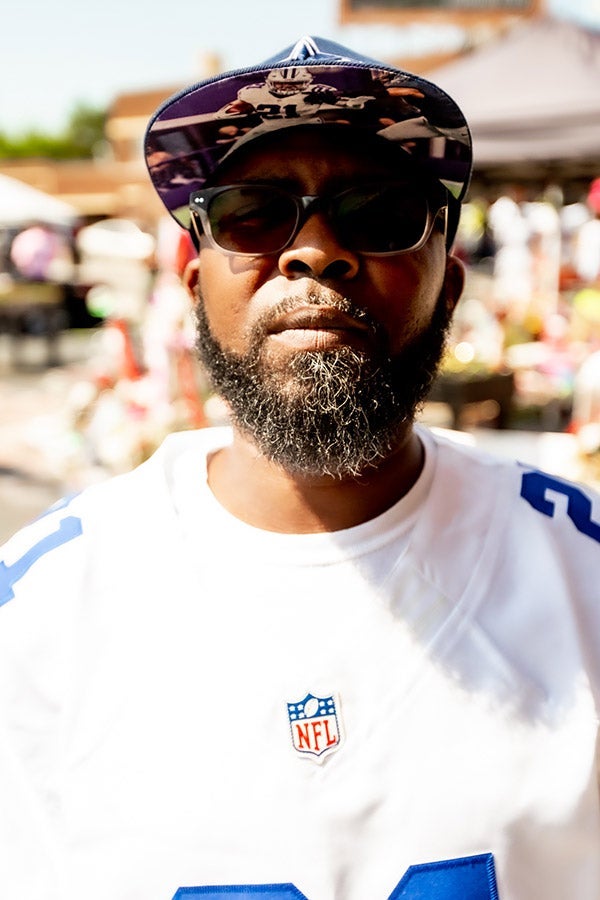
Flowers, trinkets, and signs with handwritten slogans are scattered everywhere, with protest graffiti on every conceivable surface. Tourists take photos with the large raised-fist sculpture at the center of the intersection and with the wooden fist that activists bolted onto the bus stop across the street.
Over the past few months, the brothers have made several attempts to repair their relationship with the community, which are also attempts to save their business. In the immediate aftermath of Floyd’s killing, they publicly offered to pay for the funeral and announced that there were going to be significant policy changes on the subject of when employees should call the police (only in cases of violence). Mahmoud told me he has met privately with different members of Floyd’s family. He said the meetings included Floyd’s children’s mother, his brothers, cousin, and uncle. “The conversation was pleasant,” he said. “No animosity at all.” (I reached out to ask Floyd’s family about the meetings and what they think should happen to the store several times through their lawyer but didn’t hear back.)
The brothers also hired Jamar Nelson, a childhood friend, to work as a public relations liaison. (He also does consulting for local political campaigns.) Nelson has had a few ideas about how the store could reopen, including a second mural on the Chicago Avenue–facing façade of a big heart, filled with the names of the many local victims of gun violence in the area who’ve died before, and after, Floyd. When I met Nelson, he showed me a scar on his head he said came from his own interaction with the police.
Nelson told me he believes CUP Foods has been unfairly vilified. “You can get angry at the Beckys or the Karens of the world because those are malicious, spiteful calls to the police,” he said. “This was not that. This is a business that takes extreme caution with calling the police, period. They got raided for not calling the cops. This is a community store,” he told me.
The generic Arab store owner has become a cliché in many Black neighborhoods. In my experience, interactions at stores like this tend to be short, and bulletproof glass between clerks and customers creates a barrier both real and psychic. I’ve heard customers call Arab clerks “ock,” an affectionate term short for “akhi,” the Arabic word for brother. But Arab clerks are often viewed as racist, or at the very least hostile, toward the Black communities they serve. I have seen the hostility myself, growing up in Newark, New Jersey, a majority-Black city where many corner stores are operated by Arabs.
That’s not what it looks like at CUP—the store has photos of generations of customers on the wall. But I asked Mahmoud if he recognized that dynamic. He knew what I was getting at. “A lot of Arabs are racist, and it shows. They go in Black communities and open stores, and they don’t respect [the community],” he said. “But,” he insisted, “that’s the opposite of us. I have confidence in our community. We’re going to open, inshallah. It’s just a matter of time.”
Nelson also rejected the idea that this dynamic might have played a part in Floyd’s death. “It’s hard for me to say that someone brown is racist, especially immigrants that come from war-torn countries. Because they battle white folks, they know how the white man exerts power. It’s a prejudice more than racism, because prejudice comes from ignorance. A brown man who knows what being oppressed means—c’mon, I can’t call that person racist.”
Outside of CUP Foods, Nelson showed me where the brothers were thinking of putting in a permanent rose garden to memorialize Floyd and victims of gun violence. “I’m fed up because so many people are misinformed,” he said. “CUP didn’t kill Floyd.” Nelson wishes that people would focus less on blaming the store and more on “trying to worry about a kid that is forever traumatized. Because this will never go away.” The community, he said, is trying to heal. And “if healing doesn’t involve CUP Foods,” he asserted, “then that’s not real healing.”
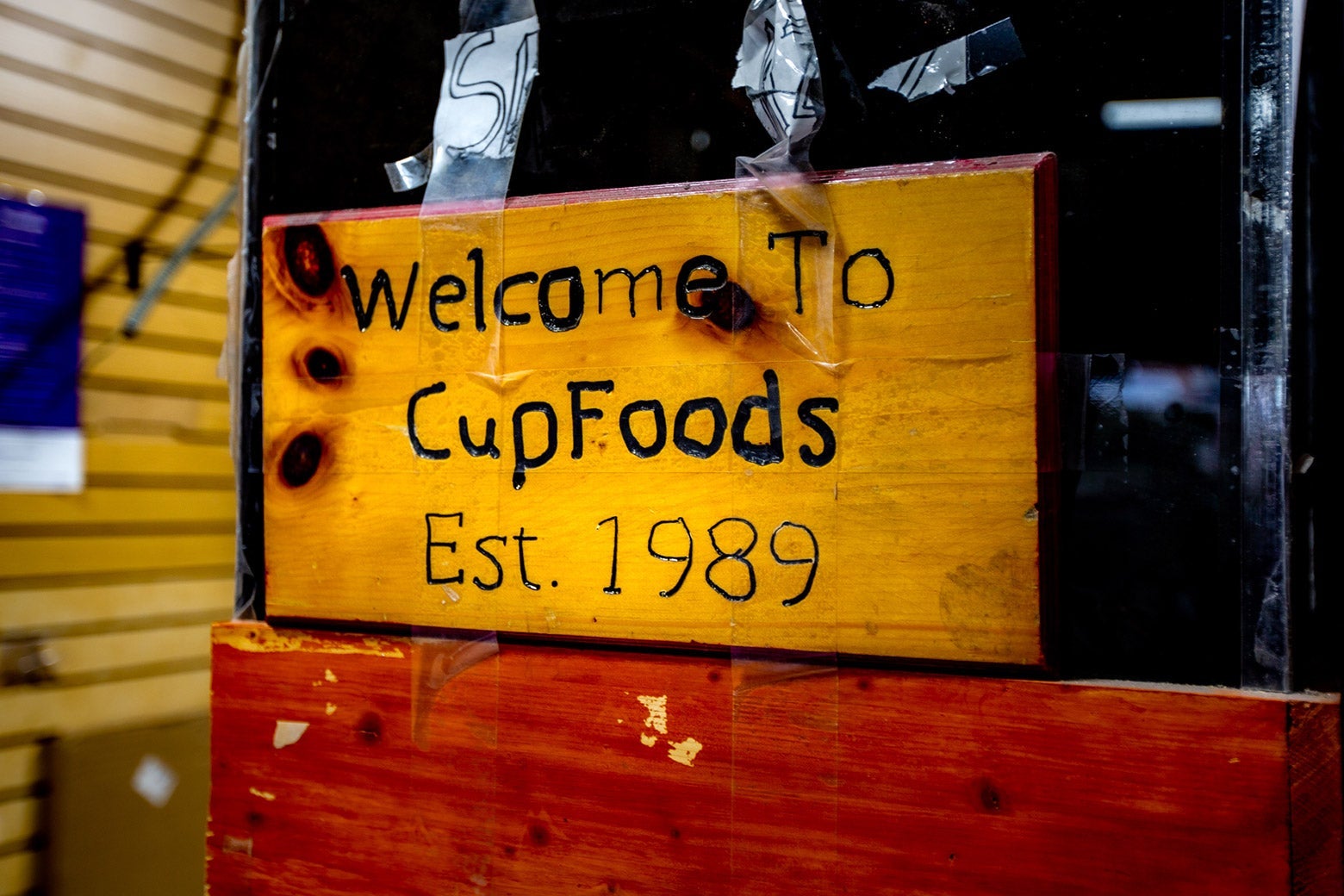
One Friday in late July, the brothers gathered in the store’s basement mosque to talk over an informal offer to buy the store. “They’re trying to strong-arm us,” Nabil said. “Let them know this is not a serious offer,” Mahmoud said.
They walked and talked, up the stairs and into the store. Their plan had been to wait out the protests, but with the lights off and the door still locked, they knew that was a gamble. On the façade of their building, the words “FUCK CUP FOODS” were scribbled. The offers—from where, the brothers didn’t say—weren’t close to the store’s appraised value. But even if they had been, they would have been tough to swallow. Ahmad told me, “It was never for sale anyways.”
After more than two months mostly dark, CUP Foods finally reopened on Aug. 3 to a very different neighborhood. Protesters tried to force it to close again, barricading the entrance with large trash receptacles. But this time, the Abumayyalehs decided to forge ahead. The business is now bringing in around 70 percent of the revenue it did before Floyd’s killing. The streets around the store are still closed off to vehicular traffic, so the people who shop there now only buy what they can easily carry on foot, usually chips, cigarettes, or water.
Not long after the store reopened, I stood outside taking notes. A woman walked past the door and, seeing CUP Foods open for business, exploded with emotion. “There are people shopping in that store!?” she exclaimed. “Ha! That store won’t last.” She kept shouting as she walked down the street. “This is the motherfucker that should have burned down,” she said. “Bitch-ass A-rabs.”
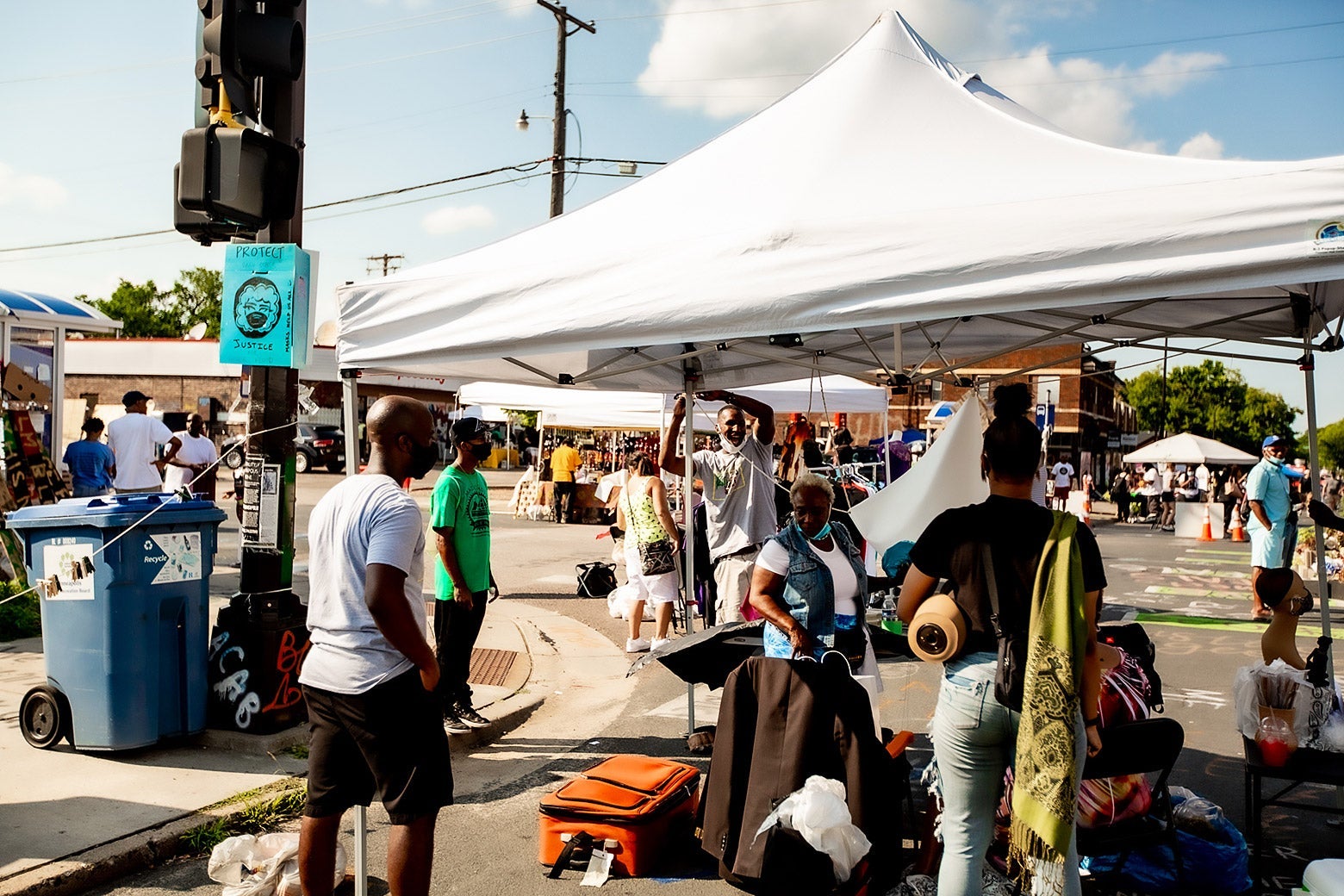
Minneapolis announced plans to reopen George Floyd Square to street traffic the week of Aug. 17. (The Minneapolis Police say they would not have forcibly removed the barricades.) About 100 people lay down on the street that Monday to show their dissent. The barricades remained.
The protesters’ goal is to have the city agree to what Marcia Howard calls Resolution 001, a list of 24 demands designed to improve the lives of everyone in the neighborhood. (Howard also acts as an unofficial representative of the protesters in the square to the City Council.) They’re seeking local government investment in job initiatives, a “contingency fund” for small-business owners of color, and work training for the next generation.
Howard said her wishes for the store are tricky. “They are in this community, and their shoppers are in this community. You cannot protest CUP Foods without protesting the people who patronize them. That’s the sticky part,” she said. “And so there’s work to be done with the people who find it necessary to shop there, and there’s work to be done for the family of owners in this neighborhood who monopolize a great deal of businesses. Everybody is trying to be on the right side of history, and that is going to take community building and conversations.”
Toussaint Morrison, a Black Lives Matter organizer in Minneapolis, said he doesn’t actually see any problem with CUP Foods reopening. But he doesn’t necessarily think anyone should shop there. We met in a local coffee shop a short drive away from George Floyd Square. “The first Black-owned bookstore just opened. That shows you how far behind Minneapolis is,” he told me.
Morrison envisioned turning the corner of 38th and Chicago into a new Black Wall Street, where Black residents can get special business loans so Black Americans can be the ones earning family wealth in their own communities. “People are ready to ride for 38th and George Floyd, and people will fight for it,” he said. “But the people have to vote with their dollars, and in the Black community, we’re not used to that because historically [the ability to do that has] been stripped away from us.” On CUP Foods reopening, he said, “I say get a Black-owned corner store near there, and say shop here. We’ll beat all of their prices. Even if we lose money, whatever.” The point, he said, is to keep Black money in the Black community: “Whether they open or not, it’s on us as a community to not buy their shit. It’s that simple.”
Asked about it later, Nabil called that idea ridiculous: “What’s the difference between having a Black corner store and an Arab corner store? If this was a white corner store, I’d say, OK, I see his point. But Arabs, we struggle just like everybody else.” He added, “You’re asking the only brother that has Black kids. My kids are Black.” His sons are expected to take over management of the store to keep it within the family. “By them opening their own store, what do you think my kids are going to do? It makes no sense to me,” he said.
Across from CUP Foods one afternoon, I met Tahasha Harpole, a graphic designer selling T-shirts from her local shop with Black Lives Matter slogans printed on them. Harpole doesn’t think the Abumayyaleh family has done enough to make things right. She knows them well. Her grandmother’s house, where she lives now, is one block away. When she was younger, she recalls that the owners would hang bounced checks on the wall behind the register as a scam deterrent. One of the checks had her last name on it—it was a relative’s—so she gave Hamadeh the money for the check, and he took it down from the wall. The next day, she asked him for a job, and he gave her one. “I was the first girl to work there,” she told me.
“Nobody saw this coming,” said Harpole, who is Black. She said she could attest to the store’s relationship with customers but also said it isn’t enough. She suggests that the brothers could work with entrepreneurs in their vicinity, sharing space inside the store to open stalls for Black-owned businesses, and maybe even offer managerial roles.
Although tension between the protesters and CUP Foods is still evident, Howard recently found reason to go inside—after a white vandal sprayed black paint over a mural on the store memorializing George Floyd. “We got together to capture Daniel the Defacer,” she told me. “I got him on the phone, I said, ‘Mike, do y’all have a security camera out there?’ He said, ‘Yeah I’ll see you in the morning.’ So I went back into his little security office behind the counter of CUP Foods, and I recorded while he was playing it. That’s me and him on the video that just went viral.”
Although they have been here for more than 30 years, Howard believes things can never return to normal for the brothers. “They have been gentrified by history,” she said. “This is now, including CUP, a national historic site. How they handle that as a family, and as a corporate entity, is going to either redeem their legacy or further tarnish it. And that is still yet to come.”
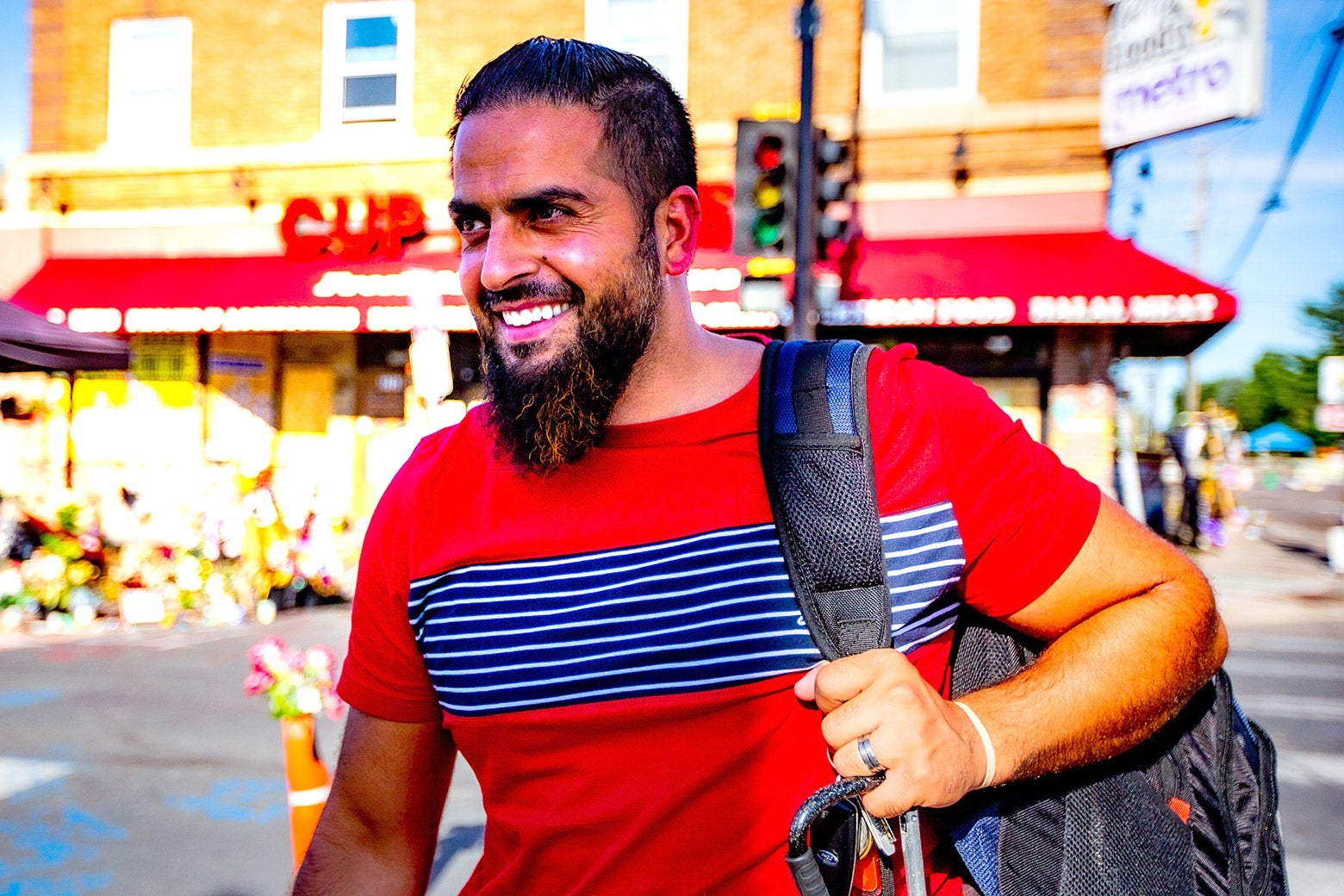
When I first met Mahmoud, I asked him if he could ever imagine doing anything else but running CUP Foods. “Absolutely not,” he told me. “Never in a million years.” But day by day, the idea didn’t seem so foreign. Mahmoud recently laughed about the rumors that celebrities like Jay-Z and Stevie Wonder wanted to buy CUP from the family. He told me he’s waiting on those offers.
Some have called for the store to become a community center. Mahmoud and his brothers aren’t against the idea of turning the space into a permanent memorial for Floyd, but they say that idea doesn’t require them to pack up and leave. “What we want to do is a joint venture, so we’re part of the movement, not to just sell it and move on,” Mahmoud said.
One of the last days I was there, Mahmoud’s 13-year-old son was working a shift in the cellphone repair section. With business a little slow, he was mostly walking back and forth, swinging a keychain, killing time. “I want to be an architect,” he told me. I asked him if that means he’d move on from the store. “No, I can do both. I can work at the store and be an architect. I’d make mad money that way,” he said.
The family remains in close touch with Malik. The last time I talked to him, he said his father kicked him out of his house in the months after the 911 call, because of what he described as a “problem between me and my parents.” But he sounded slightly more upbeat and said he was managing to support himself. “Thank God—that God is helping me to not do that bad stuff that I’d regret,” he told me.
Back at the store recently, one of the customers, Sal, a tall Black man with a voice so quiet it’s close to a whisper, was teasing Mahmoud’s son, joking that he’s gotten taller but not any stronger. He told me he’s been coming in since he was a kid. “I grew up around here,” he said. “It’s where we can get together, conversate, run into people.” I asked him what he made of the protesters outside who think the store ought to be replaced with a community center. “It already is a community center,” he said.
In the basement mosque that August weekend, the imam was late, so a worshipper stepped in to give the sermon in his stead. It was focused on George Floyd. “He was a Black man, but you don’t have to be Black to feel like that was you,” he told the group gathered beneath CUP Foods. “He was a human being first and no human ever should die the way they killed him. No one. Not Black. Not white. Not Muslim. Not Christian. Not Jewish. Nobody.” It’s “terrorism,” the worshipper said—“what they did to him, and to all of us.”